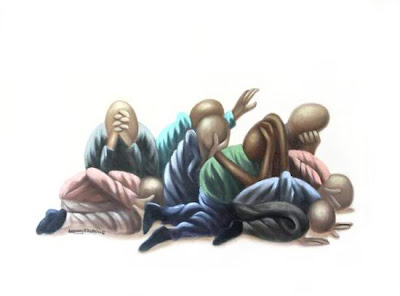This is a great week for recognising and puncturing our inflated egos and for deflating any sense that our own efforts can become anywhere near to equal the all encompassing scope of the love of God.
Compunction is a word we don't hear much these days, but this week it seems to be one that is particularly relevant.
It was a term defined by the aptly named St John of the Ladder, one of the great figures in early monastic spirituality, as "the grief that makes for joy."
Martin L.Smith, in his book A Season for the Spirit says :
" Compunction is utterly different from remorse.
There is no room in true compunction for self-loathing and the indulgence of lashing ourselves with blame....
Compunction does not keep us from raking over the failures of the past, fascinated by our sins.
The Holy Spirit turns us to the future, a future in which our hearts will be transformed so as to be as hospitable as the heart of God.............
The spiritual quest is not for interesting "spiritual experiences" but for the expansion of our capacity for mercy, the opening of our hearts wide enough to embrace the world, and not just the fragments of it, here and there, which at present we manage to feel and care about.....
He says this prayer:
" Spirit of God, have I ever felt true compunction ?
Regret, remorse, self-criticism, deploring my failings----- all these I knew.
But as I struggle now to be truthful I realise there is often a self-centredness in these feelings and little joy.
There is a secret pleasure in wounding my self-esteem further with blame. But where is the joy at being forgiven, the pain of facing the paltriness of my compassion, and the joy again of looking forward to my own full conversion ?
These can only come as your gift.
No effort of mine can generate the "grief that makes for joy."
Today, I desire to make a new start.
In my self-examination let me not lose myself in the contemplation of my own inadequacies.
In my self-examination let me not lose myself in the contemplation of my own inadequacies.
Let me lose myself in the contemplation of the all-inclusive embrace of God's love in which I am held.
Only then will I be able to bear the pain of being shown how little I reflect that mercy in my own life.
Only then will my desire to have a merciful heart be kindled."
Richard Rohr's explanation below on compunction is also worth reflecting on this week:
"Moral scrutiny is not to discover how good or bad I am and regain
some moral high ground, but it is to begin some honest “shadow boxing”
which is at the heart of all spiritual awakening.
Yes, “the truth
will set you free” as Jesus says (John 8:32),
but first it tends to make you miserable.
The medieval spiritual
writers called it “compunction,” the necessary sadness and humiliation
that comes from seeing one’s own failures and weaknesses.
Without
confidence in a Greater Love, none of us will have the courage to go
inside, nor should we.
It merely becomes silly scrupulosity (2 Timothy 3:6) and not any mature development of conscience or social awareness.
People only come to deeper consciousness by intentional struggles with contradictions, conflicts, inconsistencies, inner confusions,and
what the biblical tradition calls “sin” or moral failure.
The goal is
actually not the perfect avoidance of all sin, which is not possible
anyway (1 John 1:8-9, Romans 5:12), but the struggle itself,
and the encounter and wisdom that comes from it.
God brings
us—through failure—from unconsciousness to ever-deeper consciousness
and conscience.
How could that not be good news for just about
everybody?"
From Breathing Underwater: Spirituality and the Twelve Steps, pp. 29-31, 35



No comments:
Post a Comment